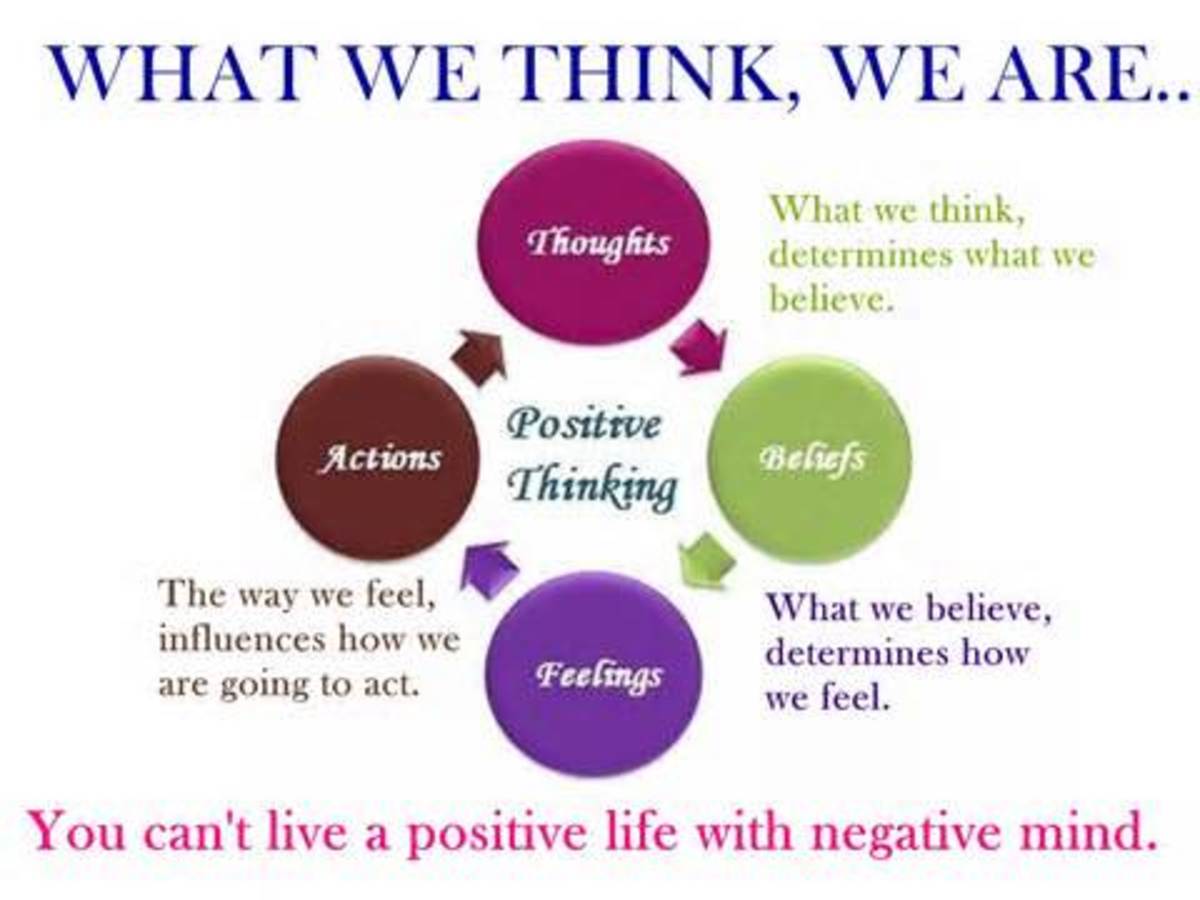Money Mind
What is the Money Mind?
In the Money Mind hub I am going to talk about the relationship between the way a person thinks, his attitude towards money and wealth, and the resulting financial status. For it is a person's personal mind and his attitude toward money and wealth that determine whether or not, he is truly wealthy.
To start with lets look at the predominant social conversations of the 3 major financial classes of people. If you spend some time listening, you will notice three dominant themes amongst their thinking and the focus of their talking.
The first and poorest class are the poor. Their conversations are focused on people and rumors. They talk about who did what and to whom. They spend a great deal of time judging other people and passing on rumors. They complain about the need for government to do this or that. When they see a problem in their life, they look for someone to scapegoat. They are always a victim.
The middle class tend to talk and focus on things. They are usually willing to work to acquire them. Many of them will buy and sell things at a profit. They understand the value of money and are willing to work for it.
Lastly, most rich people tend to talk and focus on ideas. They are constantly reading books and learning new skills. They talk about potential markets for new products. They are always looking for new solutions to problems.
I mentioned this aspect of social conversation to my wife the other day and she thought I was being overly critical of people and making stuff up. A couple of days later while going to a party, I asked her to categorize the conversations while we there. It worked out better than I expected.
The first group was complaining about tenants at their apartment complex that appeared to be on drugs. They were also trying to figure out who broke the new television that had been bought for the community room. It turned out that all of these people were living off of welfare.
The second group was talking about their vehicles and where to find antique stuff to sell on Ebay. Later, they began talking about the best place to work. One gal was talking about whether or not to switch jobs. Her current job payed $30 per hour, but she was only working 20 hours per week. She was offered another job at $25 per hour working full time. She was trying to decide if it was worth giving up some of her free time to go from $600 per week to $1000 per week. She was quite happy where she was currently working and making more money than she spent. Most of the people in this group were well paid hourly employees.
The last group that we joined was talking making games for the new Android operating system. The conversation was about different versions of the OS, which phones should be concentrated on for testing, and comparing Android phones to Apple iPhones. Their conversations were focused on ideas connected to the Android.
This last group actually turned out to be mixed. Four of them earned over $120,000 per year, but they actually owned slightly less stuff than the middle class group. Their cars were about 10 years old (and paid off), while the middle class group was making large payments on new cars. The last groups extra money went into savings and into their house payments. Their were two other people in that group that were unemployed and struggling.
After we left the party, my wife and I talked about the different mental focus of each group. She had noticed it also. I asked her what she thought of the two unemployed people in the last group versus the disabled people in the first group. Which ones would do the best in the future. She suspected that those two would be doing much better in the future than the first group that was focused on their problems.
Now I am not knocking being on disability income. What I am complaining about is people who get on disability, complain about their lives, and then don't use the opportunity to expand their horizons. Even if someone is trapped to a wheelchair, they could still learn to program, build websites, write stories, or make some youtube videos. The internet has created all sorts of opportunities for those who are trapped at home, especially those with lots of free time.

Money Mind Thinking Habits
Here are some more of the thinking differences between the average rich person and the average poor person.
- Rich people choose to get paid for results. Poor people want to get paid by the hour.
- Rich people focus on their wealth, poor people focus on their income.
- Rich people act in spite of fear. Poor people let fear stop them.
- Rich people are constantly learning new skills. Poor people think they are done learning.
- Rich people are bigger than their problems. Poor people are smaller than their problems.
- Rich people are willing to promote themselves and their services. Poor people think self-promotion is bad.
- Rich people hang with positive and successful people. Poor people hang with other negative and unsuccessful people.
- Rich people admire other successful people. Poor people are jealous of the successful.
- Rich people focus on opportunities, while poor people focus on obstacles.
- Rich people focus on big opportunities, while poor people focus on small problems.
- Rich people are focused on getting rich, while poor people are focused on spending money or avoiding work.
- Rich people think of money and life as a game and play to win, while poor people are focused on avoiding failure.
- Rich people focus on maximizing their gains, while poor people are focused on minimizing their losses.
- Rich people believe that they are responsible for their own lives, while poor people think that they have no control over their own life or circumstances.

Learn to be Wealthy
Even when they have the same income, the rich are distinct from the poor. Take two people earning a grand per month. This may not seem like much money, but the difference is in the way the money is used.
The poor person will begin acquiring things and then spending money to maintain or replace them. His expenses will rise to a grand per month. He will save nothing and will be trapped by his possessions.
The rich person will begin saving as much of that money as possible. Many rich people attempt to live off of only half their income. The other half is for improving their future earning. If necessary, they will become homeless to save money.
I know someone who worked minimum wage as a cook. He owned nothing but his clothes and slept on different couches at the homes of his friends. When they tired of him, he slept at the homeless shelter. He did this for several years.
Finally, he accumulated enough money to make a down payment on a small hole in the wall restaurant that was doing poorly. He worked all day seven days a week. He slept there at night and put all his money back into improvements into the restaurant.
Today, his restaurant is very successful and the last time I talked to him, he was considering selling it and buying a much larger restaurant.
Several years ago, I knew a gal who inherited about a $100,000. She was fairly intelligent, but had been having serious trouble finding a job. I suggested that she use the money to open a small store. I have known several people who have successfully opened up small stores with significantly less money.
She said it was just too hard and besides, what if something went wrong? She decided to save and carefully use her money. I suggested that she at least buy some silver or gold coins. Recently, I talked to her again and she told me that most of her money had slowly ran out. I asked how much she had put into precious metals since gold had doubled in price and silver had tripled in price since her windfall.
Her response was that she hadn't bothered. She didn't know where the coin shop was located and she didn't know anything about investing. My only thought was "what a waste". Her attitude was only how to live off her money as long as possible, while it should have been on how to successfully invest it.
Money Friends - Thinking Positive
Are your friends negative and focused on poverty? Is so, then you need to find new friends. Acquiring money and wealth is both a habit of mind and action. One of the best things you can do is to hang around people who are focused on ideas and how to implement them.
This may even require you to move. Some states and places seem to accumulate a lot of negative people who will not take responsibility for their own lives. Their thoughts and actions can be contagious and drag down a whole economy.
Other places seem to accumulate positive people or at least have pockets of them that you can hook up with. These are the people you need to make part of your social group. If you can't find them in your neighborhood or move to a better place, you can at least try and hook up with them online. For instance, I find the Hubpages forums to be mostly positive. There are many successful hubbers that have slowly built up a nice monthly income.
After reading this article, I hope you understand how your mind is the foundation of money and wealth. Furthermore, I hope this hub has given you some encouragement or ideas to be wealthy. If you can read this hub, then I truly believe that you can be successful. Here are some more of my hubs on making or investing money.






